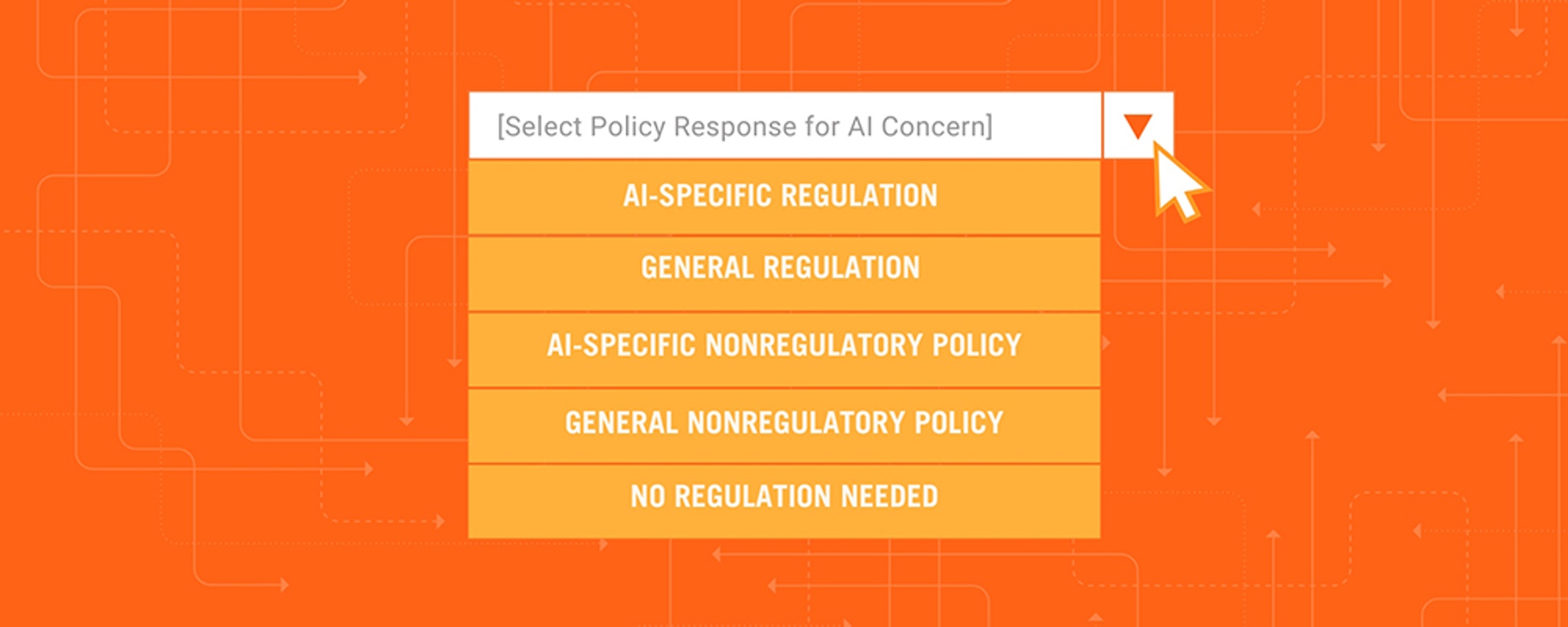
Center for Data Innovation
ITIF’s Center for Data Innovation formulates and promotes pragmatic public policies designed to maximize the benefits of data-driven innovation in the public and private sectors. It educates policymakers and the public about the opportunities and challenges associated with data, as well as technology trends such as open data, artificial intelligence, and the Internet of Things. For more, get the Center’s weekly emails and visit datainnovation.org.
Featured Publications
Public Sector AI Adoption Index

Governments are entering a critical phase in the adoption of AI. It is already contributing to everyday public sector work, and the question is no longer whether to adopt AI, but how to do so both effectively and responsibly. The Public Sector AI Adoption Index 2026 focuses on the human side of AI adoption, examining how it is experienced by public servants every day.
Why AI-Generated Content Labeling Mandates Fall Short

Mandatory labeling for AI-generated content, particularly through watermarking, is neither a reasonable nor effective solution to the issues policymakers seek to address. Rather than singling out AI-generated content, policymakers should prioritize building trust within the digital ecosystem as a whole.
Digital Transformation Should Be at the Heart of the UK’s Economic Agenda

The UK stands at a critical moment when embracing digital transformation, AI, and data innovation is not just an opportunity but also a necessity. By implementing forward-thinking policies, the UK can not only drive economic growth but also position itself as a global leader in emerging technologies.
Events
January 20, 2026
Advancing Multilateral AI Partnerships: A Pre-Summit Event for 2026 AI Impact Summit
Ahead of the 2026 AI Impact Summit in New Delhi, the Center for Data Innovation and The Dialogue are convening an official pre-summit event, sponsored by Google, in Washington, D.C., on January 20, 2026.
November 20, 2025
Improving Workplaces With Data and Technology
Watch now for a panel discussion on how data and technology can create safer, healthier, and more productive workplaces, and the policies needed to encourage adoption while protecting workers.
September 16, 2025
What It Will Take to Bring the Global South into the US AI Alliance
Watch ITIF's Center for Data Innovation discussion on how the United States can build a durable AI alliance that creates strategic partnerships that are mutually beneficial and contains China’s growing technological influence in the Global South.
May 13, 2025
How Americans Feel About AI—and Why It Matters for Policy
Watch now for a timely discussion by ITIF's Center for Data Innovation and Public First surrounding new polling data exploring how U.S. public sentiment toward AI is evolving. The conversation unpacks where Americans see promise or peril, how their views have shifted over the past year, and what these perspectives mean for lawmakers, business leaders, and the future of AI policy.
April 17, 2025
Is U.S. Policy Ready for Agentic AI?
Watch now for a panel discussion by ITIF's Center for Data Innovation on what the rise of agentic AI means for innovation, competition, and policy, how prepared the United States is to keep pace, and what policy shifts might be needed to ensure consumers and businesses can successfully develop and deploy AI agents.

Vice President and Director, Center for Data Innovation
Information Technology and Innovation Foundation
Read BioMore From the Center
February 19, 2026|Blogs
The Grid Act Is the Wrong Way to Protect Consumers from Price Spikes
The GRID Act misdiagnoses the problem of rising electricity costs by treating data centers as inherently extractive and imposing punitive requirements, rather than addressing flawed market design. A better approach is a flexibility-first model that rewards adjustable AI demand, allowing data centers to support grid stability while protecting households from price spikes.
February 13, 2026|Blogs
Event Recap: Pre-Summit Event for 2026 AI Impact Summit
The India AI Impact Summit will test whether the United States can position itself as a credible AI partner to emerging economies by advancing collaboration with India on adoption, compute equity, and governance to deliver secure, scalable, and impactful AI deployment.
February 5, 2026|Op-Eds & Contributed Articles
Plea for Transatlantic Ties, Not Technological Autarky
In a letter to the Financial Times, Daniel Castro argues that Europe’s push for “digital sovereignty,” exemplified by France replacing Zoom and Teams with a domestic platform, risks fragmenting the transatlantic digital ecosystem and weakening security and efficiency, and that true resilience comes from interoperable systems, shared rules, and cooperation among allied countries.
February 4, 2026|Op-Eds & Contributed Articles
The Sane Insanity of Digital Sovereignty
Matthew Kilcoyne in World Commerce Review argues that Europe’s pursuit of digital sovereignty risks fragmenting the digital economy and weakening innovation, and instead calls for coordinated, interoperable infrastructure, open data flows, and shared standards to preserve scale, efficiency, and economic growth.
January 29, 2026|Blogs
Three Ways the EU’s Payment Sovereignty Strategy Undermines European Consumers
The EU’s “payment sovereignty” push is a misdiagnosed, protectionist project that would benefit incumbent banks rather than consumers. Europe should instead pursue regulatory reform and use existing tools like interchange caps and PSD2 to promote competition and lower costs.
January 7, 2026|Blogs
New York’s AI Safety Law Claims National Alignment but Delivers Fragmentation
New York’s AI safety law claims alignment with California, but its small deviations create duplicative state requirements that fragment U.S. AI policy and increase compliance costs without improving safety.
January 5, 2026|Blogs
How Yesterday’s Web-Crawling Policies Will Shape Tomorrow’s AI Leadership
The Internet may be forever, but regulatory frameworks should not be. Decisions made today about web crawling will help determine where the next generation of AI leadership emerges—whether in Europe, the United States, or elsewhere.







